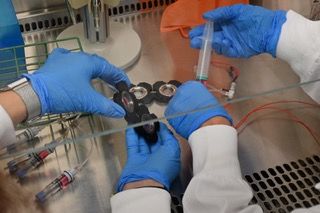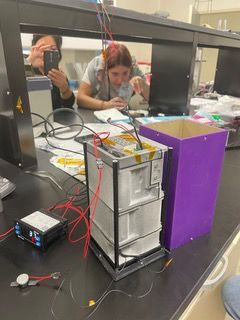
Ovospace is back home: Sapienza's successful experiment in collaboration with Nasa and ASI to unravel the effects of microgravity on fertility and reproduction
On Nov. 7 at 5:35 am over the U.S. East Coast, the NG-18/Antares rocket was successfully launched from NASA Wallops Flight Facility (Virginia).
The carrier rocket launched the Cygnus spacecraft, bringing supplies and scientific experiments to the International Space Station. These included the OVOSPACE project experiment, funded and coordinated by the Italian Space Agency (ASI) and designed by a group of researchers from the Department of Experimental Medicine at Sapienza University led by Mariano Bizzarri.
OVOSPACE aims to study the effect of microgravity on the endocrine functions of two types of bovine ovarian cells: theca cells and granulosa cells, which are responsible for the production of androgens and their transformation into estrogens, in order to support oocyte maturation and thus fertility. In laboratories made available by the Eastern Virginia Medical School (EVMS) in Norfolk, Virginia, the Sapienza team comprising Andrea Fuso and Valeria Fedeli, Noemi Monti and Tiziana Raia set up the experiment by placing the cells in a 'MiniLab' capable of ensuring the cells' survival in an automated manner. The MiniLab, or so-called 'flight hardware', was developed by Aerospace Laboratory for Innovative Components S.c.a.r.l. (ALI Scarl), whose technicians were also present at the EVMS for assembly and testing. 72 hours after arrival on the ISS, the cells will be 'fixed' again thanks to the MiniLab, pending their return to Earth in January to perform the planned molecular analyses.
The on-orbit experiment helps to understand biophysical factors' involvement in the oocyte maturation process. The results of OVOSPACE will play a key role in human health and reproduction on Earth, but also with a view to long-term space missions and human settlements on other planets.
-------------------------------------------------
On February 16, 2023, at the 'Fabbrica dell’Innovazione' Technology Centre in Naples, technicians from the space company ALI opened the MiniLab containing the OVOSPACE experiment shortly after its return from the International Space Station. The hardware units were found to be intact, with viable and developing cells, thus confirming the technological and scientific success of the mission, which represents the first important step in understanding the functionality of ovarian cells in microgravity (space environment) and how this affects their proper activity, endocrine and supporting oocyte maturation.
The results of OVOSPACE will play a key role in human health and reproduction on earth but also with a view to long-term space missions and human settlements on other planets.
Further Information
Professor Andrea Fuso
Department of Experimental Medicine
M(+39) 3402905072
Professor Mariano Bizzarri
Department of Experimental Medicine
(+39) 3386125118







